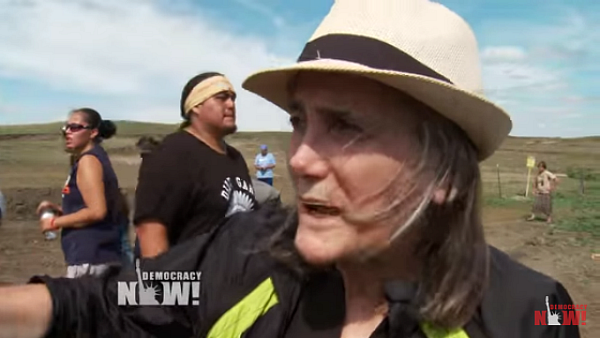North Dakota State’s Attorney Ladd Erickson has dropped criminal trespassing charges against Democracy Now!’s Amy Goodman—and is instead seeking to charge her with participating in a riot, Democracy Now! (10/15/16) reported today.
Both sets of charges relate to Goodman’s coverage of protests against the Dakota Access Pipeline project, which is opposed by a Native American–led coalition that is concerned about its threat to sacred and historic sites, North Dakota’s water resources and the planet’s climate. While accusing a journalist of trespassing for covering a breaking story of vital public interest is a clear threat to freedom of the press (FAIR.org, 9/15/16), a riot charge would be even worse, because it would attempt to criminalize Goodman’s point of view as a reporter.
In emails to Goodman’s lawyer quoted by Democracy Now!, Erickson acknowledged that it would be difficult to convict Goodman of trespassing because of “legal issues with proving the notice of trespassing requirements in the statute.” But Erickson suggested that Goodman could be charged with rioting because she “was not acting as a journalist” while documenting security guards using pepper spray and siccing attack dogs on protesters. Erickson asserted to the Bismarck Tribune (10/11/16) that Goodman was “a protester, basically. Everything she reported on was from the position of justifying the protest actions.”
Erickson’s professors at law school no doubt explained to him that the First Amendment does not permit prosecutors to charge people with crimes based on their point of view. Whether Goodman was covering the story because she thought it was important news or because she sympathized with the protesters—or simply because she’s doing the job she’s paid to do—does not affect the fact that she was acting as a reporter. Under Erickson’s legal theory, reporters covering Birmingham’s protests in the 1960s would have been stripped of the protection of the Bill of Rights if it could be proved that they intended to show that Bull Connor’s treatment of civil rights marchers was unjust. This kind of interrogation of journalists’ motives needs to be rejected, and hopefully will be when Erickson’s request to charge Goodman goes before a District Judge John Grinsteiner on Monday, October 17.
As the Center for Constitutional Rights’ Katherine Franke said in response to Erickson’s prosecutorial threat:
Filming Native Americans being violently attacked as they defend their land is not rioting, it’s called journalism, it is protected by the First Amendment, and indeed, it is an essential function in a democratic society.
Meanwhile, documentary filmmaker Deia Schlosberg has been charged in North Dakota’s Pembina County with three felony counts in connection with her filming Dakota Access protests: conspiracy to theft of property, conspiracy to theft of services and conspiracy to tampering with or damaging a public service (Huffington Post, 10/14/16). These charges, too, appear to be based on prosecutors’ presumption that Schlosberg was sympathetic to the protest, which State’s Attorney Ryan Bialas deemed to be “not a protest” but “a criminal action.” It seems it’s illegal for journalists to have political opinions in North Dakota.
Jim Naureckas is the editor of FAIR.org. You can follow him on Twitter at@JNaureckas.

